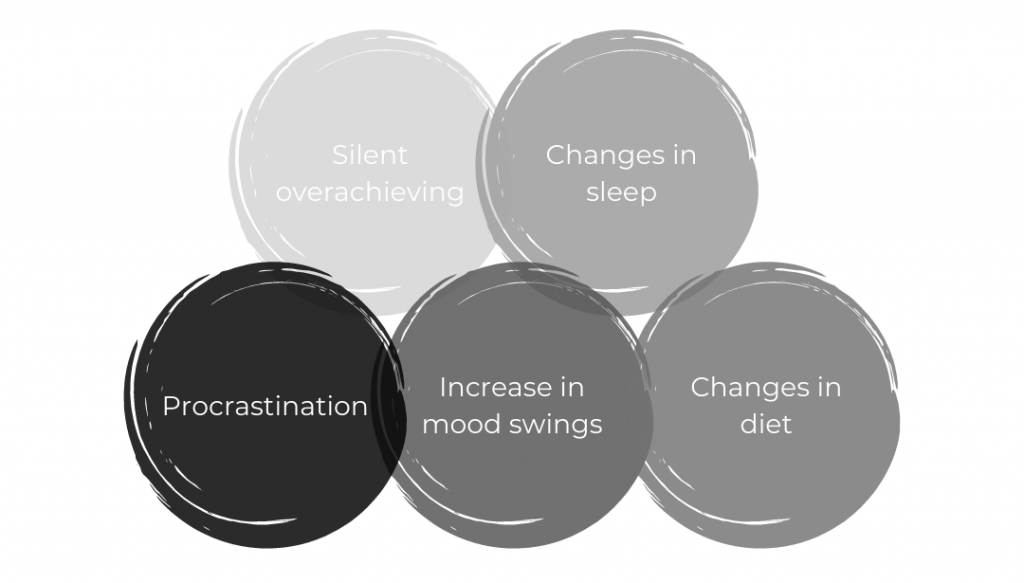Completing the HSC can be an incredibly stressful ordeal at the best of times, and it’s hard to know if you’re looking after yourself properly. The impact of anxiety can also make it even harder.
We chatted with Maddy Forwood, Senior Youth Work Specialist at Mountains Youth Services Team (MYST) to understand some of the key signs that anxiety may be impacting your HSC study.
Keep reading to learn about these signs and how you may work through them.
Silent Overachieving
Changes in Sleep
Procrastination
Increase in Mood Swings
Changes in Diet
Maddy told us that importantly, the way you handle the impact of anxiety depends on the type of person you are. It is important that you recognise both your strengths and your triggers as you develop strategies to care for your mental health.
Sign #1: Silent Overachieving
How do we recognise this?
Maddy explained that many students who have always been academic and pride themselves on achievement will continue to receive good marks despite anxiety.
“It’s these young people that I worry most about,” she said. “They’ll hide that they are feeling stressed but things aren’t going well under the surface.”
For these students, their HSC may not be academically affected. They may still do very well and get their desired marks. However, their social and mental capacity will likely suffer severely.
It may be normal to feel anxious in high-pressure situations, such as before a big assignment is due or in exam week. However feeling continually anxious without any means of expression can have long-term detriments.
According to headspace, students suffering with high-functioning anxiety may work themselves in a “worse-case scenario”, from which their plans for the future and university become rather bleak.
What can you do if you feel like a silent overachiever?
The best thing you can do is find someone to speak to about your anxiety!
“We identify support networks… who [young people] might be able to go to and say they are feeling really overwhelmed,” Maddy said.
This may seem really difficult. Vicing what is in our heads can be daunting. However, talking to someone about your anxiety and its impact can help you to sort through issues, see a situation more clearly, gather a new perspective and identify new solutions.
This may help to make your HSC marks even higher than they currently are, but more importantly, it will help you live a healthier life.
Sign #2: Changes in Sleep
How do we recognise this?
Changed sleep patterns can be a key symptom of anxiety, especially in school environments where it is already difficult to get the recommended eight hours.
“The sleep and school schedule already doesn’t work for young people,” Maddy said. “It is normal for adolescents to go to bed at 12 or 1 am [and wake up later], but the school system doesn’t allow for that.”
If you have anxiety, you are more likely to have higher sleep reactivity. This means that your body knows it is stressed and finds it very difficult to sleep well throughout the night.
Not only will you be sleeping less, but your circadian rhythm will likely be disrupted. This means you will not enter as many phases of REM (or deep sleep) a night and your body will continually feel tired.
What can you do about changes in sleep?
There are practical steps you can take, like “trying not to be on your phone an hour before bed, or eating stress-busting foods like nuts and berries,” Maddy said.
However, she believes it is important that students recognise their situation and work with it, rather than trying to fight it.
If you benefit from schedule, then creating a consistent routine before bed, including doing something you enjoy, can be really beneficial.
Intense study and anxiety are a terrible mix when it comes to getting enough sleep. It’s important to focus on the quality of your rest as much as the quantity, and to be gentle with yourself, even if you don’t always get it right.
If you’re having trouble falling asleep, check out some useful apps here!
Sign #3: Procrastination
How do we recognise this?
Maddy told us that many anxious students recognise the amount of work they have to do and simply shut down, leaving things until the last minute.
“[We know students] are underworked and disengaging, because it becomes too much,” she explained.
For many students, procrastination is a symptom of fear. If students feel they will not do as well as they hope, or that an assignment is too hard, putting it off can create a sense of relief. It then makes sense that students suffering from the impact of anxiety are more likely to procrastinate as they seek to avoid negative experiences.
This is particularly true of HSC study and is something many anxious students are affected by.
What can you do about procrastination?
If you are a chronic procrastinator, it may not be the end of the world, especially when it comes to your HSC marks. “It’s about acknowledging your strengths and working with that. If you’re a procrastinator, you’re a procrastinator!” Maddy said.
Some students perform best, both academically and mentally, when they finish school tasks last minute. It’s therefore more important to deal with the anxiety behind procrastination, rather than the act of procrastinating itself.
That said, creating a timetable and trying your best to stick to it will really benefit your HSC results and general mental health. Scheduling study time means your assignments will be completed efficiently, giving you more time to socialise and take care of yourself.
Learn about strategies you can implement to lessen your procrastination here!
Sign #4: Increase in Mood Swings
How do we recognise this?
“Anxiety around HSC comes from external pressure, but it’s also internal — it pushes the stress levels in the brain massively,” Maddy explained.
If you are very anxious, your hormone balance and neurotransmitter production often changes, altering the way messages are sent to your brain. This change in chemical makeup can cause your mood to ‘swing’ drastically, as the amount of serotonin and norepinephrine in your body is affected.
On top of this, anxiety is tiring, and we all find it difficult to regulate our emotions when we feel worn out.
All of this can affect our study drastically. You may feel demotivated and unable to complete work.
What can you do about mood swings?
First, it is important to recognise that your mood is changing, for whatever reason. Being aware of this will help you to keep track of how your brain is changing.
Exercise is a great mood regulator, as it increases the blood flow to your brain, helping you to think more clearly. It also promotes the release of endorphins and serotonin — the ‘feel good’ chemicals that can help decrease anxiety.
Another great way to balance your mood is by speaking to someone. When we chat to people not directly involved in an anxious situation, we can gain a second perspective and therefore develop a healthier outlook.
Sign #5: Changes in Diet
How do we recognise this?
When we are anxious, it is easy to reach for immediate comfort, including your favourite snack. “Sometimes people start fuelling themselves far less than they need… or in a way that isn’t helpful,” Maddy said.
There are two main ways that anxiety may impact your diet during HSC study.
You may eat less than usual. This may be because you don’t feel like you can stomach a lot of food, or because your ‘flight or fight’ response has kicked in, causing you to run away from tasks like consuming balanced meals. On a biological level, this means your nervous system is telling your adrenal glands to pump out excess adrenaline, therefore your desire to eat may be put on hold.
More commonly, those who are anxious will eat more food than normal as a way to feel comfortable and satisfied. When you have high cortisol levels, you may be more likely to consume high amounts of fatty and sugary foods and snacks at higher rates.
What can you do about changes in diet?
There is evidence to suggest that eating well can actually ease anxiety. Consuming foods with high levels of vitamins like folate, B12 and choline, or minerals like magnesium, zinc and omega-3 fatty acids may help relieve high levels of anxiety.
However, it may be very difficult to do this while you are very anxious. Creating a basic food plan for yourself and having set times at which you eat may be useful. You could even try a meal service like HelloFresh if that appeals to you.
Getting social support, including talking to friends about your eating habits, is also really beneficial.
At the start, go easy on yourself and try to aim for one nutritious meal a day. You don’t have to cut out snacking all together, but it can be very beneficial for your HSC and overall anxiety to be conscious of your diet.
Other Advice and Getting Help
HSC is an ultimately stressful time. However, clinical anxiety is a real problem, and something we really encourage you to get help with.
Your HSC study may suffer a little, but it is far more important that you are feeling mentally healthy.
If you believe you may be suffering from the impact of anxiety, find someone you trust to chat to. This may be someone at home, school, or in a club.
There are also some professional places you can find resources, including:
-
- Stress Less (a program run by MYST)
- Reachout
- headspace (which also offers a counselling service)
- Your school counsellor
Need advice on how to handle stress during the HSC? Check out our article here!
Lucinda Garbutt-Young hopes to one day be writing for a big-shot newspaper… or maybe just for a friendly magazine in the arts sector. Right now, she is enjoying studying a Bachelor of Public Communication (Public Relations and Journalism) at UTS while she writes on the side. She also loves making coffees for people in her job as a barista, and loves nothing more than a sun shower.





